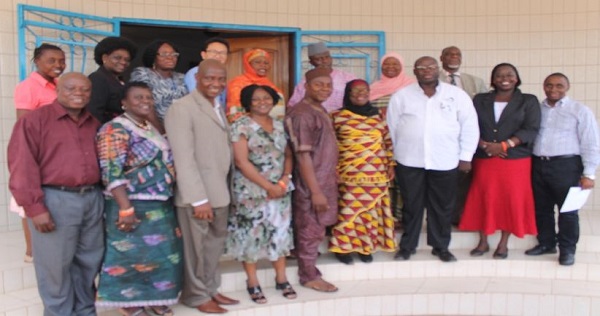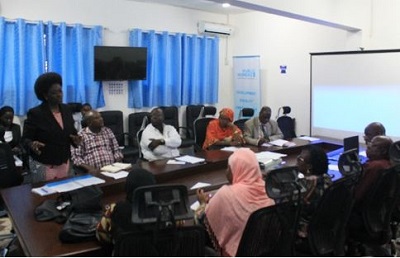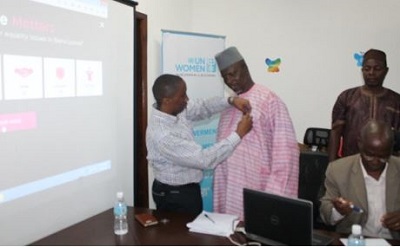UN Women Engages Inter-Religious Council on Women's New Proposed Recommendations to CRC.
Date:

The Inter-Religious Council in Sierra Leone has promised the women of Sierra Leone its fullest support in order to ensure that their new proposed recommendations to the Constitutional Review Committee (CRC) is achieved. They made this promise during a one day consultative session organized by the UN Women Country Office at Aberdeen Road in Freetown on Tuesday 5 April 2016. The Country Representative of the UN Women Dr. Mary Okumu told the representatives of the Inter-Religious Council that the purpose of the meeting was to get input from them on the recommendations and also to help strategize on how to achieve the recommendations. She said the Council controls a huge constituents of the country’s population and that the office also thought it fit to consult them on the issue in order to help pass the message to their people. Dr. Okumu told them that the women have analyzed the country’s 1991 constitution from a gender perspective and they thought that the issue of equality must be an entrenched principle in the reviewed constitution. Whilst she commended citizens for the peaceful process of the review, she however noted that only three of the views of the over four thousand women that were consulted countrywide about what they want to be captured in the proposed constitution was captured. She emphasized on the need for women to be given their rights, quoting from the Swahili language “Wengi Wapeh” which she says means “Give to the majority” adding that women make the bulk of the population of Sierra Leone but that they do not enjoy their rights. She also called on the CRC to review provisions related to traditional activities of the country because according to her it is in those areas that women’s right are violated adding that equality should be made a state principle in order to make representation easy at all levels.

Speaking on behalf of the Council, the Secretary General, Rev. Dr. Usman J. Fornah said that they will embark on a social mobilization tour in the country to engage their members at all levels to make them understand the call of the women as stated in the document. He said the executive would first engage heads of the council about the meeting to be followed by those with key religious leaders in the country who would in turn educate their constituents on the issue. He noted that the executive is willing to join the women in media activities like radio discussions. Rev. Dr. Fornah told the UN Women that the Council is a big fan for the promotion of women issues in the country, stating that their stance on the ‘Safe Abortion Bill’ does not mean that they were against the course of women.
Sana Balote the Chief Technical Advisor for the CRC project in the United Nations Development Program (UNDP) country office in Sierra Leone gave an overview of the CRC process, he told the councils representatives that the recently launched abridged version of the CRC is a summary report and therefore urged them to continue the debate on it and to make suggestions about other important issues. He informed them that there is a high respect for women in many societies and would therefore be no discrimination on women’s rights issues. He stressed the need for national consensus on the issues regarding women’s right before the CRC and also about the relevance of women’s empowerment to Sierra Leone’s development. He commended the UN Women for supporting the issues of women in the country especially on this CRC process encouraging it to continue. As the group deliberated on the proposed nineteen point recommendations the women have put together again to present to the CRC, they amongst other things agreed that the recommendations are all good but that all cannot be factored in the review process because it will be bulky. Besides, they pointed out that most of the issues mentioned in the nineteen points are already in sub statutory documents which will be updated. In the area of political representation, members had divided opinions as to whether or not the call for election of candidates by political parties must be 50% from all constituencies. Some argued that since it is the masses who determines a winner, even if the party gives women symbols they will not win if they are not empowered and popular. Therefore, some expressed fear that political parties would not want to give their symbols to a candidate who they are not sure will win. However, it was made clear that the percentage was arrived at during a preliminary discussions following a lot of concerns that were raised about the behaviors of political party decision makers. They also agreed that section 274d and e which discriminates against women should be expunged completely and therefore should form part of the existing recommendations.

The inter-religious council representatives have promised to get on to the Gender Technical Team (GTT) again after they would have reported the outcome of the meeting to their heads. The meeting was climaxed with the pinning up of the male executive members of the Inter-Religious council with the HeforShe badge by UN Women HeforShe champion and programs specialist Marbey Sartie, following their signing and pledging of commitment to the campaign.